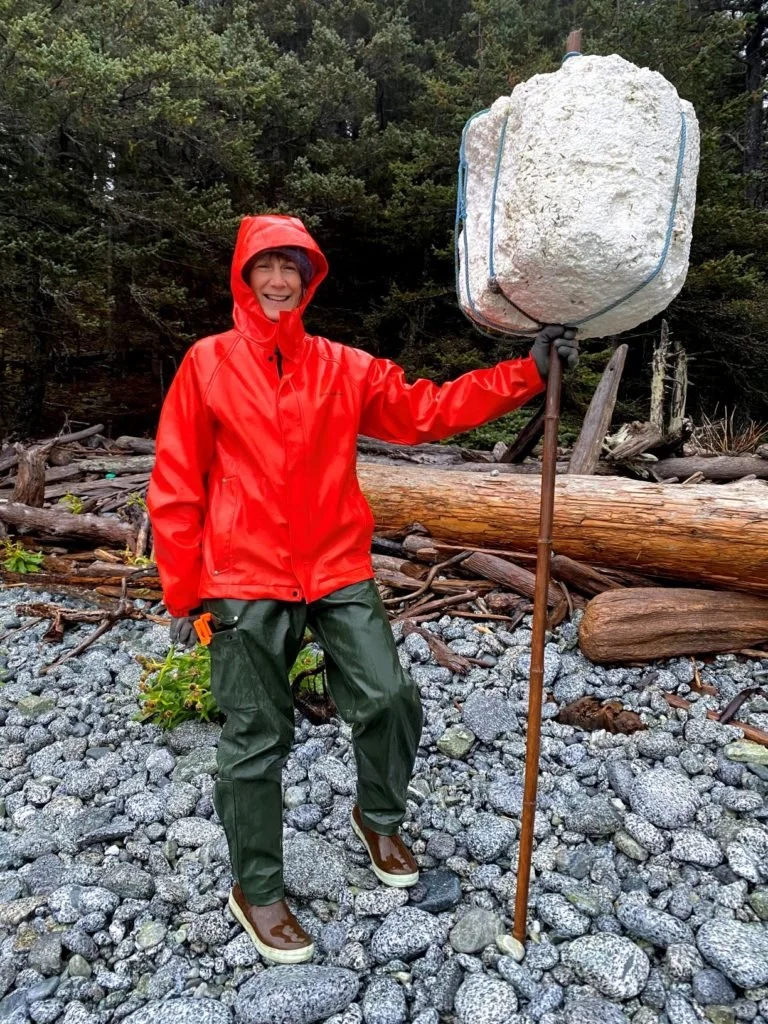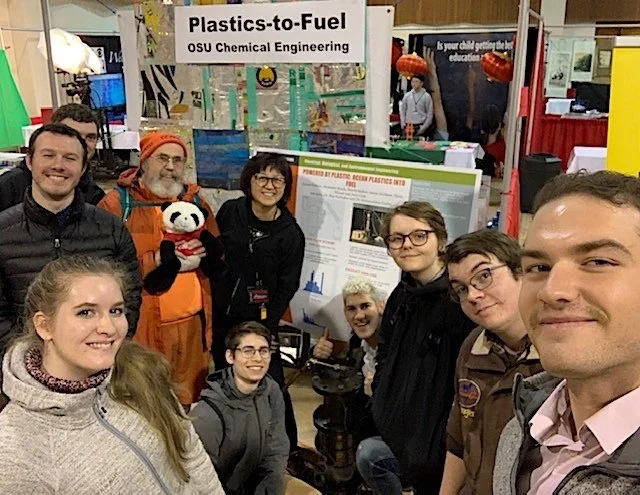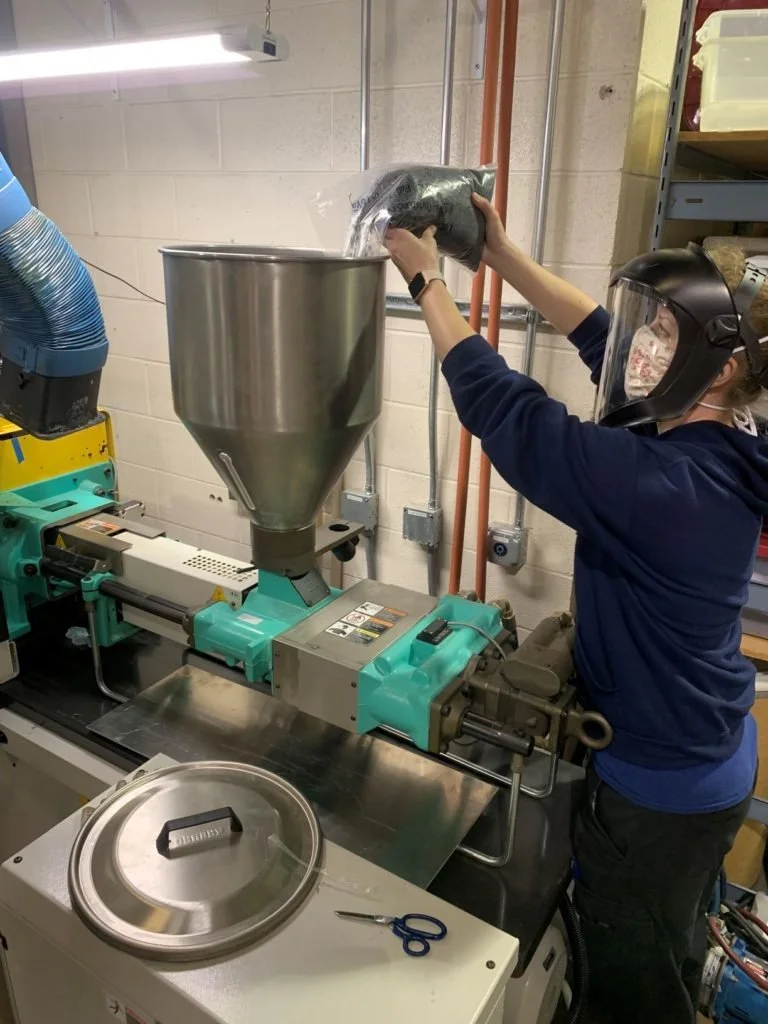2020 Annual Report
We are pleased to report that our initiatives at OPR continued to move forward in 2020. Our work to identify existing demand and, through partnerships with leading research universities, to develop new recycling alternatives for ocean plastics made significant progress this year. We have also continued to expand our industry collaboration and research efforts.
Collection
Although our spring clean-ups were canceled due to COVID-19 concerns, by the fall we were back in the field assisting with an effort led by Island Trails Network that collected 24,000 pounds of marine debris from the Afognak and Kodiak Islands on the Alaska coast. OPR will take the lead on sorting and characterizing those materials and will use them for research this winter and spring.
Volunteer Mary Forbes poses with a piece of ocean-recovered polystyrene on Afognak Island during the September removal expedition. ITN photo.
We also joined our friends at SOLVE to participate in a beach clean-up along the Oregon coast in September. The quantity of debris we collected was small compared to what we find in Alaska but was indicative of the huge effort and impact this organization and their army of volunteers have made over the years. While scouring the beach for litter and marine debris, several community members thanked us for our work. Clearly SOLVE’s local cleanup leader, Jeneé Pearce-Mushen, is a well-recognized force in protecting our coastal environment in Oregon.
One of the highlights of 2020 was learning that OPR was awarded a matching grant of $205,000 to help fund a large-scale marine debris clean-up effort on the coast of Katmai National Park, a national treasure that has been severely impacted by marine debris. The removal effort is funded by a grant from the National Oceanographic and Atmospheric Administration (NOAA) and will be followed by in-depth analysis of the plastics collected in order to determine the best recycling methods and likely recycling markets for plastics recovered from the marine environment. The findings of the research will be published to assist ocean clean-ups throughout the United States and abroad.
Outreach
OPR was also busy sharing our story and what we have learned throughout the year. We began with a presentation at the UNC Clean Tech Summit in February, followed by a presentation and workshop on the sources and impacts of ocean plastics at the Green Schools Conference & Expo in Portland, Oregon in March. As the pandemic took hold in the United States, we went virtual with presentations and panel discussions at the Plastics Re|focus Summit and the Society of Plastics Engineers (SPE) Conference. Topics included Putting Marine Plastics to Work in the Supply Chain and Recovering Value from Ocean Plastics.
We continue to be thrilled with the interest, in-kind support, and research funding on the part of industry – from technology providers, recyclers, manufacturers, and brand owners – in helping us make ocean plastic a viable feedstock. To accomplish this, we need to frame ocean plastics like any other commodity – in terms of supply and demand.
With an estimated 8M tons of plastic entering the ocean each year, the supply of plastic materials in circulation is heartbreaking. The ambitious clean-ups we need right now are too often burdened or even prevented by the absence of a recycling solution. On the flip side of the equation, consumer demand for environmentally responsible packaging is at an all-time high, as more and more of us think about the environmental impact of the things we use every day. In the case of ocean plastics, what separates supply from demand is a technology gap. Meanwhile, the continued loss of this material to the marine environment is a significant break in the circularity of plastics, with devastating consequences for the environment.
At OPR, we strongly believe that identifying processes and technologies that improve the marketability of ocean plastics will assist ocean and coastal cleanups around the world. They may also decrease the cost and/or carbon footprint of ocean clean-ups. Because our research also impacts other sources of recyclable plastics, including ocean-bound and post-consumer streams, we hope it will contribute to a reduction of plastic waste in general, and a corresponding reduction of loss to the marine environment.
Research
OPR was fortunate to secure a temporary space for sorting ocean plastics, preparing samples for our research partners, and fine-tuning our characterization process. Our friends at Agri-Plas, a family-owned business that has been recycling agricultural plastics for 25 years, carved out a space at their facility in Oregon to allow our work to continue until we move into a more permanent location.
Optical micrograph of an ocean plastic HDPE buoy cross-section showing degraded layer. WWU photo.
While OPR’s internal research is focused on sorting, pre-processing, and characterization of ocean plastics, we work closely with our university and industry partners to advance mechanical recycling, chemical recycling, and conversion technology solutions for ocean plastics. Our university partners are Oregon State University, Purdue University, and Western Washington University.
The team at Western Washington University (WWU) implemented social distancing protocols in the lab so that they could continue their research related to mechanical recycling of ocean plastics throughout 2020. Led by Dr. John Misasi, the WWU team kicked off their research related to recycling polypropylene lines from derelict fishing gear, studied the degradation and properties of polyethylene from recovered trawl floats, and designed a lab-scale shear shredder based on open-source designs made available by Precious Plastic and with input from the engineering team at SSI Shredding Systems.
While OPR does not have any current projects with Purdue University, we have worked closely with Dr. Nien-Hwa Linda Wang and provided input and support for multiple research grant applications during 2020. We hope to continue to grow our partnership with Dr. Wang and her team in the coming year.
Under the guidance of Dr. Skip Rochefort, the research team at Oregon State University (OSU) continued their plastics-to-fuel research in 2020 and presented their results to date at the OSU Virtual Engineering Expo in June of this year. The team discussed the progress made on designing a pyrolysis reactor for single-step conversion of waste plastics to diesel fuel. For those of you who are unfamiliar with this technology, pyrolysis uses heat in the absence of oxygen to thermally break down plastics into smaller hydrocarbons, such as those found in diesel fuel. Current research is focused on identifying catalysts to improve the quality and yield of the fuel product and on designing their next generation pyrolysis reactor – a small scale system that could be deployed in remote communities throughout the world.
Undergraduate research team poses with Skip Rochefort and donor Helen Liu. OSU photo.
The benefits of this research will extend beyond just academia. The applied research on recycling ocean plastics that we are seeing conducted at the undergraduate level is a novel concept, as hard skills involved in the actual recycling and recovery processes (how to operate a pyrolysis reactor) are for the first time being learned at university rather than on the job. This further encourages investment by an industry ready to hire those individuals upon graduation. It’s happening now.
We are especially grateful for the generous funding support provided by HP, Inc to Western Washington University for the purpose of advancing mechanical recycling solutions for entangling marine debris.
Education
Our educational efforts became even more sharply focused in 2020 on college undergraduates. We continue to work through our partner universities to recruit students of diverse backgrounds and interests to our cleanup, outreach, research, and education efforts, thereby helping to develop environmental leaders and stewards of the future. We knew from our 2019 cleanups that getting engineering students out of the lab and into the field would show them the real-life impacts of their academic work. Indeed, we are already seeing alumni from those cleanups taking jobs in the recycling industry. But we were surprised to also discover from our university partners that field work in ocean plastics was attracting more students to enroll in the engineering majors.
Western Washington student Juliana Covarrubias prepping for injection molding of test specimens made from recycled polypropylene/polyethylene from mechanically recycled nets and lines. WWU photo.
Looking Forward
As we look toward the coming year, we are poised to make our biggest impact yet. We have assembled an extraordinary team that is collecting ocean plastics, conducting recycling and recovery research at American universities, and identifying existing material flows (demand) for ocean plastics. Our work is intended to have meaningful and immediate impact on ecosystems, and to address pressing and long-term societal challenge of creating a circular economy for plastics by recapturing value from the most difficult-to-recycle plastics of all – those which enter and are recovered from the sea.
Here’s to a healthy and productive 2021!
Scott Farling & Andy Schroeder
Co-Founders of Ocean Plastics Recovery Project




